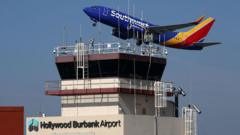The Air Canada flight attendants' strike has drawn attention to a long-overlooked issue in the aviation sector: unpaid ground work. Following their call to action, "Unpaid work won't fly," flight attendants ceased operations, forcing an examination of compensation practices that have left them unpaid for essential pre-flight duties.
While their fight disrupted peak summer travel, a deal was tentatively reached, promising a pay increase over several years and for the first time, partial pay for boarding duties. This groundbreaking agreement may set a new precedent for aviation workers across North America, challenging longstanding industry norms.
However, even with this tentative agreement, many attendants remain frustrated. Reports suggest the union, Canadian Union for Public Employees (Cupe), may face challenges in securing approval for the agreement among its members. Critics argue that hourly pay remains inadequate, especially for those in expensive urban markets.
Historically, flight attendants across various airlines in Canada, such as Air Transat and WestJet, have faced similar unpaid conditions. Joseph Gradek, an aviation management professor, asserts that Air Canada's inclusion of ground pay could trigger widespread changes across the industry.
This growing focus on pay equity follows shifts in attitudes post-COVID-19, as new boarding regulations highlighted the significant time cabin crew must dedicate to prepare flights. Delta Airlines became a pioneer last year by implementing compensation for ground work, leading to changes in compensation structures at other airlines.
While news of Air Canada's agreement claims to establish "industry-leading compensation," the resolution of ongoing disputes regarding pay structures, particularly for entry-level attendants, remains uncertain. This situation illustrates a broader movement for labor rights in Canada, as unions push back against government interventions aimed at quelling strikes.
As labor negotiations unfold within other airlines, insights from the Air Canada strike signal that the conversation around fair labor practices in aviation is just beginning. With attention now on equitable ground pay, the outcome of these negotiations holds significance not only for employees but also for the future landscape of the airline industry as a whole.






















